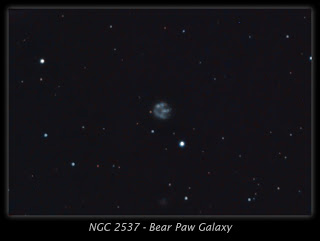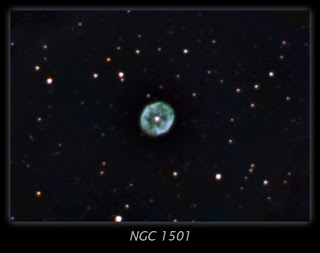Astronomy
So I have quickly learned that for some reason I have alot more difficulties shooting small objects (relatively speaking in the sky), such as galaxies and small planetary nebulas, than objects like nebulas. I had always heard nebula photography was incredibly difficult so this flip-flop in what I expected has kinda taken me by surprise. Over Christmas I shot a few smaller galaxies, most of which I had to scrap the data on as wind caused too much movement in the scope, but here is one I got of the Bear Claw Galaxy in LRGB, 30 second subs, about 80 of each channel:

Processing this to get an even background was difficult, even with flats and darks, so I thought I would give another small object a try once I got back home. Last night I shot NGC 1501, a small planetary nebula and found I had the same problems with the background, but eventually I think I came up with an ok result. LRGB, 27 second subs, Lum channel - 180 subs, RGB channels - 85 subs each.

Neither are great and neither are up to being hung on anyone's wall, but its all about learning, and over the past few months I think I have done just that. . .
I dont know if the small object difficulty is due to me being on an alt-az mount still and limited to 30 second or less subexposures (I suspect it does play a great part of it), or some other reason, but with the ccd camera I am using (Meade DSI II Pro), and my CPC800 I have a very narrow FOV so small objects are about all I can do in there. I do have an Orion EON 80ED that I use for imaging as well and get a larger FOV, not to mention my Nikon D40 that has a significantly larger chip than the DSI II Pro does, but it's results are not ideal either thanks to chromatic aberrations and other issues.
I suppose no camera will ever be perfect, and it does indeed seem like processing is the main limiting factor in astrophotography, so as the New Year starts I will continue to collect photons and in my spare time work on processing and reprocessing objects until small objects dont cause as much processing frustrations and I continue to roam the skies for more of them to shoot.
- Iris Nebula
I have been wanting to do some dark nebula imaging for a while, but had read about how difficult processing would be for such images so I held off for a while until I had the means to do longer subs. Now that I have an autoguider my sub length is sufficient...
- 6 Months Later ....
I started astrophotography almost as soon as I got my scope, which means it has now been 6 months since I took my very first astrophoto ... I am almost ashamed to show my first few shots and processing of them. The first ones of M31 and M13 were not focused...
- Finally The Clouds Clear
After endless rain and clouds for weeks, we have finally gotten some nice evenings. I was able to get to a semi-dark spot but still within a reasonable driving distance this past weekend and did a little imaging while socializing with the other astronomers...
- Finalizing Action List
The 25 free pre-orders went fairly quickly, which is exciting and I hope that everyone who gets them will find them a valuable set for processing and will spread the word about them. Likewise, I would appreciate any feedback about the actions or if you...
- Processing Comparison Of M42
I very quickly learned a few months ago when I started astrophotography that processing made all the difference in shots. Yes, it takes some skill to set up a shot and different equipment can make quite a difference, but where the real photos are set...
Astronomy
Small objects are quite difficult (at least for me!)
So I have quickly learned that for some reason I have alot more difficulties shooting small objects (relatively speaking in the sky), such as galaxies and small planetary nebulas, than objects like nebulas. I had always heard nebula photography was incredibly difficult so this flip-flop in what I expected has kinda taken me by surprise. Over Christmas I shot a few smaller galaxies, most of which I had to scrap the data on as wind caused too much movement in the scope, but here is one I got of the Bear Claw Galaxy in LRGB, 30 second subs, about 80 of each channel:


I dont know if the small object difficulty is due to me being on an alt-az mount still and limited to 30 second or less subexposures (I suspect it does play a great part of it), or some other reason, but with the ccd camera I am using (Meade DSI II Pro), and my CPC800 I have a very narrow FOV so small objects are about all I can do in there. I do have an Orion EON 80ED that I use for imaging as well and get a larger FOV, not to mention my Nikon D40 that has a significantly larger chip than the DSI II Pro does, but it's results are not ideal either thanks to chromatic aberrations and other issues.
I suppose no camera will ever be perfect, and it does indeed seem like processing is the main limiting factor in astrophotography, so as the New Year starts I will continue to collect photons and in my spare time work on processing and reprocessing objects until small objects dont cause as much processing frustrations and I continue to roam the skies for more of them to shoot.
- Iris Nebula
I have been wanting to do some dark nebula imaging for a while, but had read about how difficult processing would be for such images so I held off for a while until I had the means to do longer subs. Now that I have an autoguider my sub length is sufficient...
- 6 Months Later ....
I started astrophotography almost as soon as I got my scope, which means it has now been 6 months since I took my very first astrophoto ... I am almost ashamed to show my first few shots and processing of them. The first ones of M31 and M13 were not focused...
- Finally The Clouds Clear
After endless rain and clouds for weeks, we have finally gotten some nice evenings. I was able to get to a semi-dark spot but still within a reasonable driving distance this past weekend and did a little imaging while socializing with the other astronomers...
- Finalizing Action List
The 25 free pre-orders went fairly quickly, which is exciting and I hope that everyone who gets them will find them a valuable set for processing and will spread the word about them. Likewise, I would appreciate any feedback about the actions or if you...
- Processing Comparison Of M42
I very quickly learned a few months ago when I started astrophotography that processing made all the difference in shots. Yes, it takes some skill to set up a shot and different equipment can make quite a difference, but where the real photos are set...
